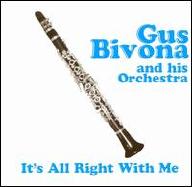He got his musical start under the close eye of is parents, both of whom were also musicians. His mother was a pianist, and learning to obey her commands no doubt set Bivona up for satisfactory later relationships with Allen as well as other keyboard giants such as Teddy Wilson and Duke Ellington. Bivona's father was a guitarist, although not on the level of Charlie Christian, whom
the saxophonist would get to record with later. The lad's first instrument was violin, but he switched to a combination of alto saxophone and clarinet at the age of 16. His professional debut was in a band led by Spider Johnson, followed by dates all around New England in Leo Scalzi's Brunswick Orchestra. Bivona must have been a quick study on the horns, since these engagements are reported as having happened not much more than a year after he switched from violin. In 1935, Bivona began a lengthy stint with the Jimmy Monaco Orchestra, based out of New York City, and also worked with
the Hudson-DeLange Orchestra. Several months with Bunny Berigan in 1938 represented the first material that would thicken the big pot of stew that is Bivona's discography. Through the end of the '30s, he also worked with bandleaders such as Will Hudson and Teddy Powell.
The first of Bivona's bands under his own name showed up in 1940, but work as a sideman in more established bands seemed to be more what he was after. This included a period with Benny Goodman from the fall of 1940 through the spring of 1941, just in time to match wits with the sizzling electric guitar solos of Christian. Prior to joining the Naval Air Force Band, Bivona gigged with Jan Savitt and Les Brown His Band of Renown, though in the latter case it was hardly long enough to be known, let alone renown. A series of high-profile gigs with Tommy Dorsey and Bob Crosby followed the end of the war, and in 1947 Bivona signed on with MGM. Many studio sessions and freelance recordings were the result, carrying on into the '50s.
Once he connected with Allen, the two would occasionally hit the concert trail, including a lengthy club residency at the Roundtable in New York City. Music for Swingers: Gus Bivona Plays the Music of Steve Allen is one delightful documentation of this relationship, originally released in 1958 on Mercury. The pair collaborated on many other recordings, always in the company of many of the top jazz players on the Los Angeles scene. Bivona is a good example of a player who seemed to have no problem keeping busy with music as he got older, with both the motivation and inspiration to turn in inspired performances on '70s recordings with vibraphonist Terry Gibbs and singer and guitarist Geoff Muldaur. ~ Eugene Chadbourne, Rovi












